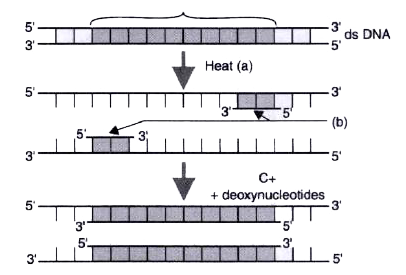Polymerase chain reaction
Is a method of synthesising human protein from human DNA
Uses restriction enzymes
Can produce billions of copies of a DNA fragment
Takes place naturally in bacteria
The correct Answer is:C
Step by step video, text & image solution for Polymerase chain reaction by Biology experts to help you in doubts & scoring excellent marks in Class 12 exams.
Updated on:21/07/2023Topper's Solved these Questions
- PRINCIPLES AND APPLICATIONS OF BIOTECHNOLOGYBOOK - DINESH PUBLICATIONCHAPTER - PRINCIPLES AND APPLICATIONS OF BIOTECHNOLOGYEXERCISE - CYG
10 Videos
- PRINCIPLES AND APPLICATIONS OF BIOTECHNOLOGYBOOK - DINESH PUBLICATIONCHAPTER - PRINCIPLES AND APPLICATIONS OF BIOTECHNOLOGYEXERCISE - Brain Teasers
5 Videos
- PRINCIPLES AND APPLICATIONS OF BIOTECHNOLOGYBOOK - DINESH PUBLICATIONCHAPTER - PRINCIPLES AND APPLICATIONS OF BIOTECHNOLOGYEXERCISE - Brain Teasers
5 Videos
- PLATYHELMINTHES-THE FLAT WORMSBOOK - DINESH PUBLICATIONCHAPTER - PLATYHELMINTHES-THE FLAT WORMSEXERCISE - check your grasp
9 Videos
- REPRODUCTION IN ORGANISMSBOOK - DINESH PUBLICATIONCHAPTER - REPRODUCTION IN ORGANISMSEXERCISE - Check Your Grasp
16 Videos
Similar Questions
A schematic representation of polymerase chain reaction (PCR) up to the extension stage is given below.

Which of the following has popularized the PCR (Polymerase Chain Reaction) ?
a) Easy availability of DNA template
b) Availability of synthetic primers
c) Availability of cheap deoxyribonucleotides
d) Availability of thermostable DNA polymerase.
View Solution(i) Mention the number of primers required in each cycle of polymerase chain reaction (PCR). Write the role of primers and DNA polymerase in PCR.
(ii) Give the characteristic feature and source organism of the DNA polymeras, in PCR.
View Solution
Knowledge Check
Study the following columns and choose the correct option
ColumnIColumnIIA.Synthetic seeds1.Anther cultureB.Gene cloning2.Interspecific hybridizationC.Haploid plants3.Polymerase chain reactionD.Trasgenic plants4.Recombinant DNA technology5.Somatic embryogenesisAABCD5314BABCD1253CABCD4132DABCD2541The polymerase chain reaction (PCR) is a noval test tbe method for amplifying first invented in 1984 by kary mullis permits the synthesis of millions of copies of specific DNA sequence in a few hours. Kary mullis (US) and michael smith (british-canadian) got Nobel prize in 1993 in
APhysicsBChemistryCPhysiology or medicineDPeaceWhich of the following statement/s regarding nucleic acids is /are wrong ?
Amplification of gene of interest is done by polymerase Chain Reaction.
Origin of replication (ori) is a sequence from where RNA replication starts.
The tumour inducing (Ti) plasmid of Agrobacterium tumifaciens can be modified into a cloning vector .
DNA technology involves the use of restriction endonucleases.
Biolistics or gene gun is suitable to introduce DNA to plant cells.AII onlyBII and IV onlyCIII and V onlyDI, II and IV only
